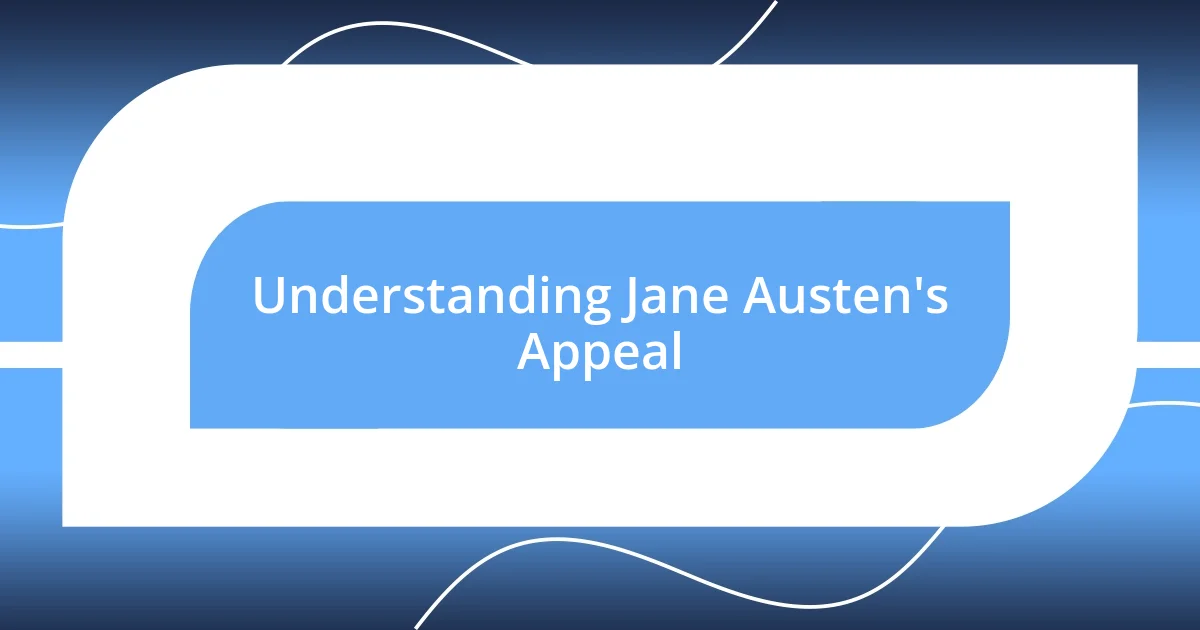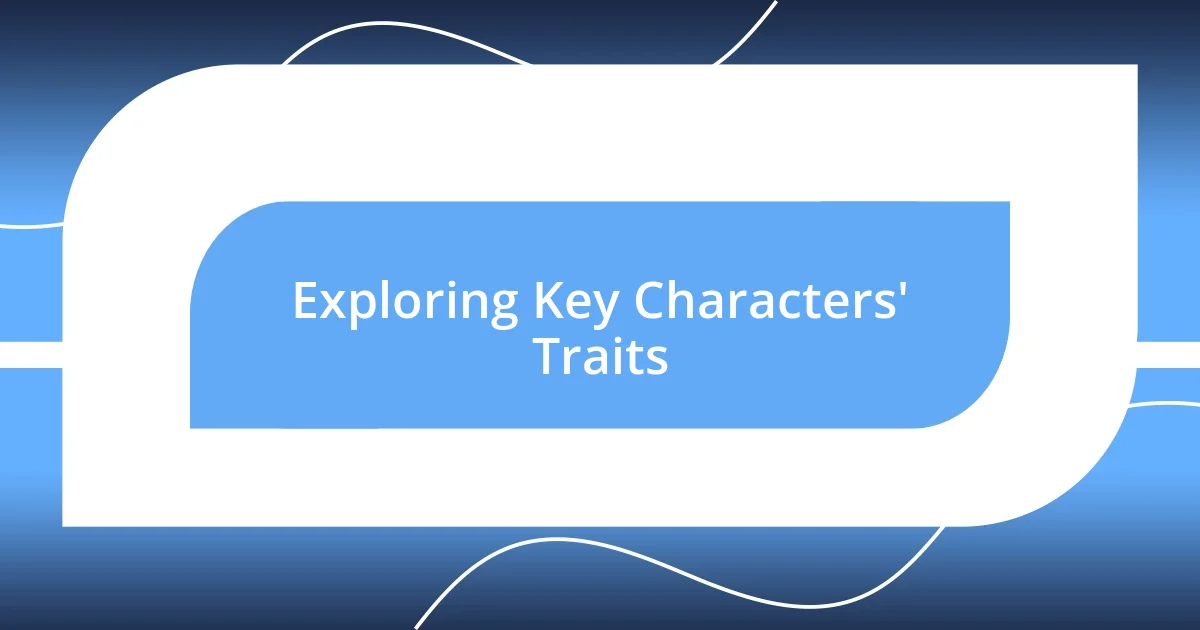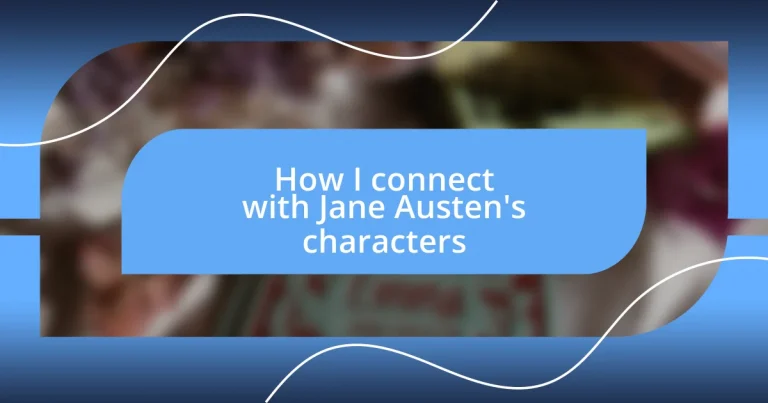Key takeaways:
- Jane Austen’s characters are relatable, embodying real-life struggles with societal expectations, personal desires, and complex emotional landscapes.
- Key character traits across Austen’s works highlight themes of self-awareness, the conflict between societal norms and personal ambitions, and the importance of maintaining one’s identity.
- The societal context of Austen’s time enriches character motivations and illustrates the pressures of financial security, leading to relatable experiences of emotional resilience and personal growth.

Understanding Jane Austen’s Appeal
The charm of Jane Austen’s characters lies in their relatability. I remember reading Pride and Prejudice during my early teenage years, and I felt an immediate kinship with Elizabeth Bennet’s strong-willed nature. Isn’t it fascinating how her struggles with societal expectations and personal desires resonate with our own journeys in life’s various social arenas?
Austen’s sharp wit and keen observations about human relationships create layers of depth that make her work timeless. When I reflect on Sense and Sensibility, I still feel a pang of empathy for Elinor Dashwood as she navigates her emotions while keeping a steadfast exterior. Have you ever found yourself in a situation where you had to put your feelings on hold for the sake of duty? That moment of internal conflict is something I believe many of us can relate to, making her characters both memorable and reflective of real life.
Furthermore, Austen’s ability to portray the complexities of love and social maneuvering invites readers into a world where every interaction is charged with meaning. I recall the first time I sensed the building tension between Emma and Mr. Knightley; I was practically on the edge of my seat. How can we not be drawn into their evolving relationship? It’s this detailed exploration of emotions and connections that keeps me returning to her novels, feeling as if I’m catching up with old friends.

Exploring Key Characters’ Traits
Delving into the traits of Jane Austen’s characters reveals their multifaceted natures. For instance, I’ve often admired the spirited intelligence of characters like Elizabeth Bennet. There’s something refreshing about her confidence and quick wit, qualities that resonate with me during my own moments of self-doubt. Each time I reread her arguments with Mr. Darcy, I can’t help but reflect on my own experiences of standing firm in my beliefs, even when faced with opposition.
- Elizabeth Bennet: Strong-willed, intelligent, and witty; she often challenges societal norms.
- Emma Woodhouse: Charming yet manipulative; her journey teaches the importance of self-awareness.
- Marianne Dashwood: Passionate and impulsive; she embodies the struggle between emotion and reason, sparking memories of my own youthful indiscretions.
- Mr. Darcy: Proud yet deeply caring; his transformation illustrates the value of humility and personal growth.
- Elinor Dashwood: Sensible and self-sacrificing; she reminds me of those times when I had to prioritize others over my own feelings.
Each character reflects various aspects of the human experience, inviting readers to both connect and reflect deeply on their own lives.

Finding Personal Connections
Finding personal connections with Jane Austen’s characters often draws on relatable experiences that resonate with our emotions. When I think of Anne Elliot from Persuasion, her quiet strength reminds me of times when I had to stand firm in my choices despite external pressure. Have you ever felt the weight of someone else’s expectations stifling your own desires? I certainly have, and that connection to Anne’s journey underscores the depth of Austen’s portrayal of her characters.
In Mansfield Park, Fanny Price’s journey of self-discovery strikes a chord with me, especially when she struggles to assert herself among her more assertive relatives. I recall a period in my life when I felt marginalized in a group setting, waiting for my voice to be heard. Fanny’s resilience against societal pressures resonates deeply, reminding me that it’s essential to honor our true selves, even when faced with opposition.
Consider how Austen illustrates the dynamics of friendship and loyalty through characters like Elinor Dashwood in Sense and Sensibility. Watching her meticulously navigate her relationships evokes a nostalgic reminder of my own friendships. I’ve experienced moments where I needed to be the emotional anchor for friends in distress. Austen captures these intimate connections exquisitely, making her characters not just fictional figures but reflections of our shared human experiences.
| Character | Personal Connection |
|---|---|
| Anne Elliot | Her quiet strength resonates with my own experiences of standing firm against external expectations. |
| Fanny Price | Her struggle for self-assertion brings back memories of my own quest for voice in group settings. |
| Elinor Dashwood | Her role as an emotional anchor reminds me of the friendships where I had to provide support during tough times. |

Analyzing Character Motivations
Analyzing character motivations in Austen’s work offers a fascinating glimpse into their inner lives. Take Mr. Collins, for instance. His unyielding adherence to societal expectations and wealth disparity often leaves me baffled—do you ever wonder how a person can be so utterly blind to their own flaws? This reflection parallels my experiences with certain acquaintances who prioritize status over authentic connections, prompting me to question the choices I make in my own relationships.
On the other hand, consider the motivations of characters like Emma Woodhouse. Her manipulative tendencies stem from a blend of privilege and loneliness; I’ve felt a similar emptiness at times in my life, leading me to act impulsively. Have you ever tried to play matchmaker, only to realize that perhaps you were simply trying to fill a void? That realization hit me hard during a time when I meddled in a friend’s love life, ultimately recognizing my own need for companionship may have clouded my judgment.
Moreover, Elizabeth Bennet’s motivations often stem from her desire for autonomy in a constrained society. I can’t help but reflect on my own struggles for independence, whether in academic settings or personal relationships. Have you ever felt the push and pull of wanting to assert yourself, yet hesitating due to societal norms? Every encounter Elizabeth has with figures like Lady Catherine de Bourgh reminds me of my own clashes with authority, reinforcing that desire to forge my own path despite the constraints around me.

Relating to Societal Contexts
Societal context profoundly shapes the interactions and decisions of Austen’s characters, making their experiences remarkably relatable. For example, when reflecting on Charlotte Lucas in Pride and Prejudice, I see how societal pressures can dictate life choices. Have you ever felt the urgency to conform to expectations that clash with your true desires? I remember feeling compelled to follow a career path embraced by my family, much like Charlotte’s pragmatic choice of marrying Mr. Collins to secure her future.
In Emma, the societal expectation of marriage as a primary goal for women adds complexity to the character’s motivations. I can relate to Emma’s ambitious spirit, as I often find myself striving for more than what’s typical or expected. Do you ever feel the urge to break free from the conventional mold? I once joined a group project that seemed like a safe choice, but realized mid-way that my heart was set on exploring ideas that were more unconventional. Emma’s journey encapsulates this struggle beautifully; she embodies the conflict between societal roles and personal ambition.
Furthermore, the economic backdrop of Austen’s time highlights just how critical financial security is to social standing and relationships. Take the plight of Jane Fairfax in Emma, whose talent as a pianist stands in stark contrast to her uncertain future. I recall a moment when I doubted my own abilities during a competitive job search, mirroring Jane’s predicament. Have you ever felt that invisible pressure weighing you down, questioning if you’re truly good enough? This shared understanding of striving against societal limitations links us to Austen’s characters in an intimate and profound way.

Engaging with Austen’s Themes
Engaging with the themes of love and societal expectation in Austen’s works often resonates deeply with my own experiences. For instance, when I think about Darcy and Elizabeth’s evolving relationship in Pride and Prejudice, I can’t help but reflect on my own journey toward understanding love beyond surface-level attraction. Have you ever fallen for someone who defied societal norms or family expectations? I remember a time when I was drawn to a friend who didn’t fit the mold my peers envisioned for me; that experience taught me that true connection often requires looking beyond what others deem appropriate.
The theme of self-awareness in personal growth particularly captivates me, especially through characters like Fanny Price in Mansfield Park. Fanny’s quiet strength and moral compass may not align with louder figures in her life, but I find her resilience incredibly inspiring. Have you ever felt marginalized in a group but found your voice during a critical moment? I recall a situation in a college setting where I hesitated to speak up during a group discussion, only to realize my perspective was invaluable. Just like Fanny, I learned that staying true to oneself can ultimately lead to growth and change.
Moreover, the pursuit of happiness against societal pressures, exemplified through characters like Elinor Dashwood in Sense and Sensibility, speaks to the inner struggles we all face. Elinor’s quiet endurance, especially in the face of unrequited love, resonates with me on a personal level. Do you ever find yourself putting on a brave face when dealing with emotional turmoil? I once navigated a difficult breakup while maintaining a composed exterior, much like Elinor did; that experience reinforced the idea that sometimes, the most profound battles occur within us, amidst the expectations of those around us. Engaging with these themes not only enhances my appreciation for Austen’s storytelling but also encourages a deeper exploration of my own emotional landscape.














